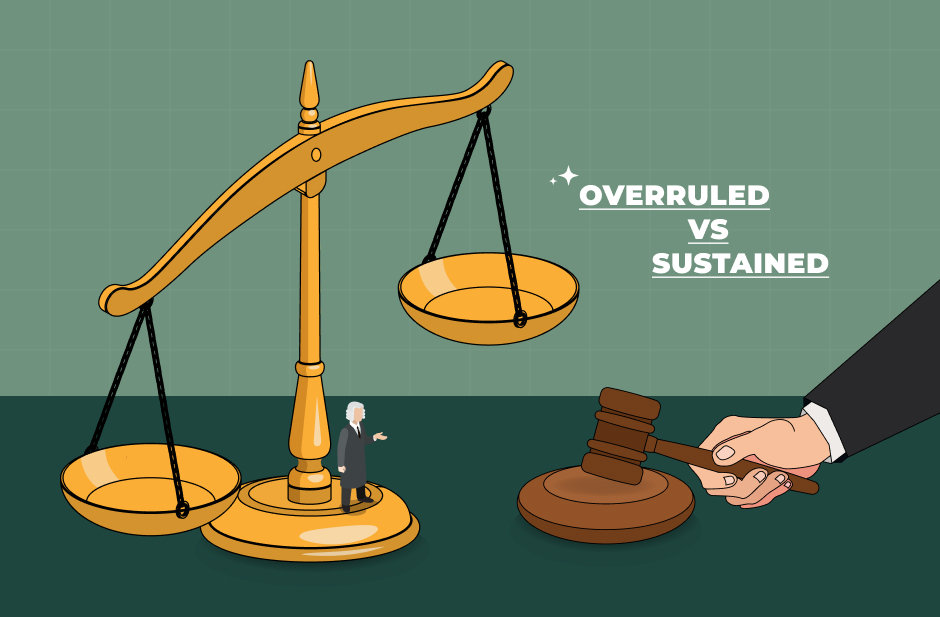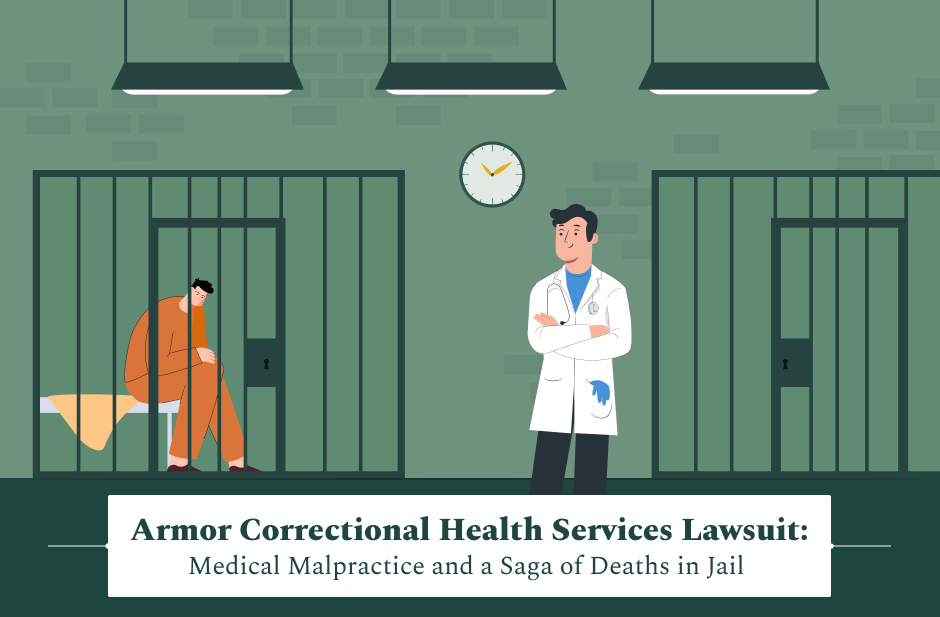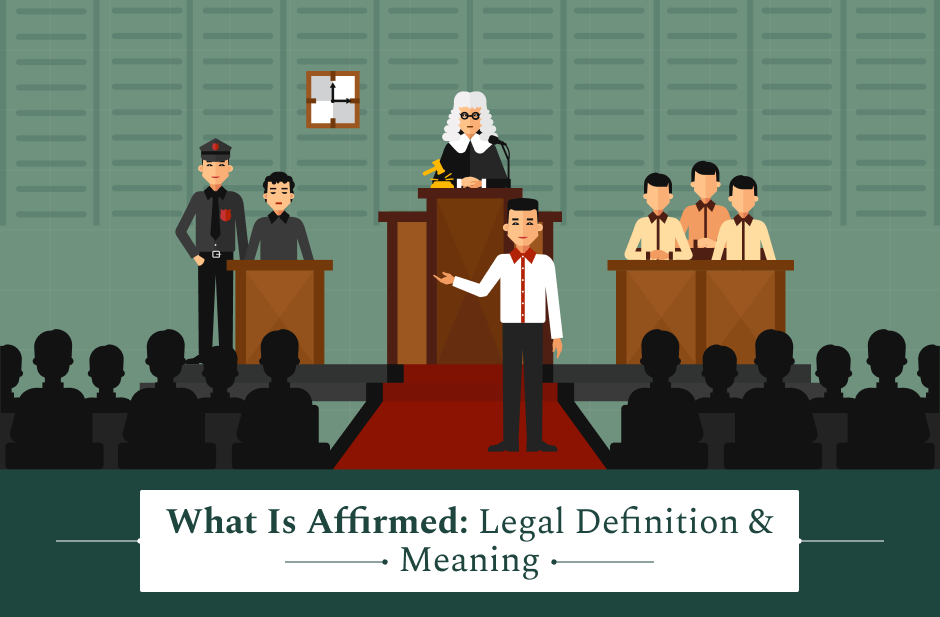I grew up watching dramas with my grandmother, and whenever there were courtroom scenes, the judges used two terms. And, you are correct; these are none other than objection overruled, and objection sustained. But what is the difference between overruled vs sustained?
I know it can be a little difficult to understand this legal jargon, but that is exactly why I am here today. I will provide a complete guide to simplify the legalese and help you understand these terms.
So, keep on reading this blog till the end, and thank me later…
What is an Objection in Court and What are Its Types?
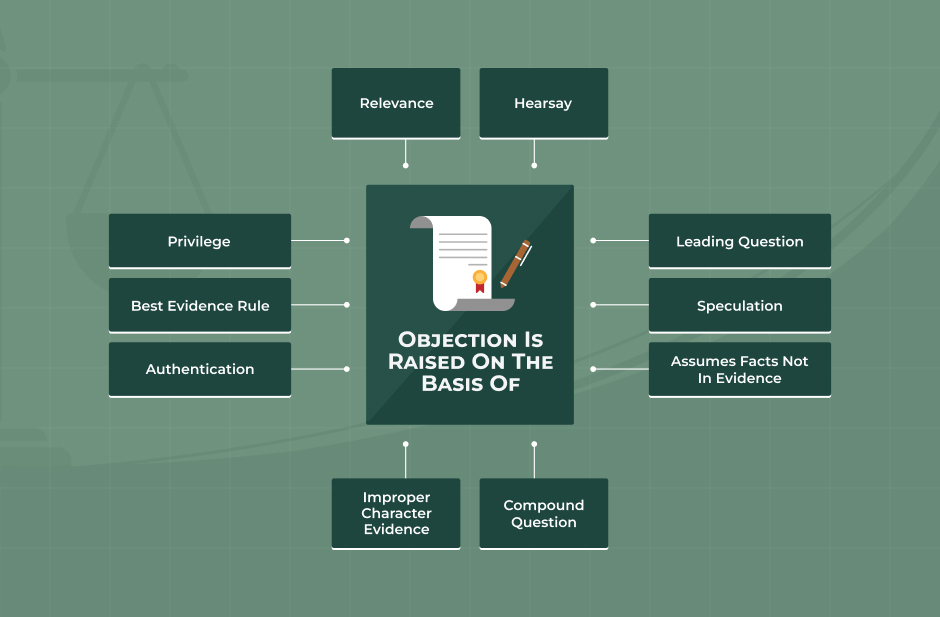
When lawyers speak in court, they have to follow certain rules. If one lawyer thinks the other is breaking a rule, they say, “Objection!” This means they believe something is unfair or not allowed.
The judge then decides if the objection is right or wrong. If the judge agrees, they say, “Sustained.” They will not allow unfair questions or evidence. If the judge disagrees, they say, “Overruled,” and the trial continues as usual.
Before talking about the differences between Overruled vs. Sustained, let me explain what are the different types of objections that exist:
1. Relevance
First, a lawyer can object if something has nothing to do with the case. For example, discussing what the accused ate for breakfast wouldn’t matter if the case concerns a stolen bike.
2. Hearsay
Second, a witness can only describe what they saw or heard themselves. For instance, if they say, “My friend told me the defendant stole the bike,” that’s hearsay because they didn’t see it happen.
3. Leading Question
Lawyers can’t suggest answers when questioning a witness. Asking, “The bike was red, right?” is a leading question because it pushes the witness to agree.
4. Speculation
A witness can only talk about what they know for sure. If someone guesses, “I think he was planning to steal the bike,” that’s speculation, which the court will not allow.
5. Assumes Facts Not in Evidence
A lawyer can’t act like something is true before proving it. For example, if they say, “Since you saw him steal the bike,” before anyone has said he stole it, that’s an unfair assumption.
6. Compound Question
A lawyer can’t ask two questions at once. “Did you see the bike, and was it red?” is confusing, and the witness might not know which part to answer.
7. Improper Character Evidence
A lawyer can’t say someone is guilty just because they did something bad before. If someone stole a bike five years ago, it doesn’t mean they stole this one.
8. Authentication
If someone brings a document or photo as proof, they must prove it’s real. If there’s no proof, a lawyer can object.
9. Best Evidence Rule
If a lawyer tries to use a copy of a document instead of the original, the other lawyer can object and ask for the original.
10. Privilege
Finally, there’s an objection based on privilege. Some things are private, like talks between a lawyer and their client or a doctor and a patient. No one can force them to share those secrets in court.
Overruled vs Sustained: What Do They Mean?
Courtrooms can feel like dramatic scenes from a movie, with lawyers standing up and saying, “Objection!” But what happens next? The judge either says “Overruled” or “Sustained.”
Let’s break down what these words mean in simple terms.
What Does “Overruled” Mean?
When a lawyer doesn’t like a question or a piece of evidence, they can object. But if the judge disagrees with the objection, they say “Overruled.” This means the question or evidence is allowed, and the trial continues.
Think of it like a classroom: If a student says, “That’s not fair!” but the teacher says, “It’s fine, we’re moving on,” that’s like them overruling.
Here are some examples:
- A lawyer objects to a question, but the judge says “Overruled”—the question stays.
- Someone brings new evidence, and the judge decides to allow it, even if the other lawyer objects.
- Sometimes, a higher court can overrule a lower court’s decision. For example, if a state court makes a ruling but the Supreme Court disagrees, they can overrule it.
What Does “Sustained” Mean?
When a judge says “Sustained,” they agree with an objection. This stops a lawyer from asking a certain question or using a certain piece of evidence.
Imagine playing a game with rules. If one player says, “Hey, that’s not allowed!” and the referee agrees, they stop the move. That’s like sustaining an objection in court.
Examples of sustained objections:
- A lawyer asks an unfair question and the other lawyer objects. The judge says, “Sustained,” and does not allow the question.
- A piece of evidence is unfair or improper, so the judge sustains the objection and removes it.
These courtroom terms help keep trials fair and ensure they only use the right information!
Overruled vs Sustained: Understanding the Differences
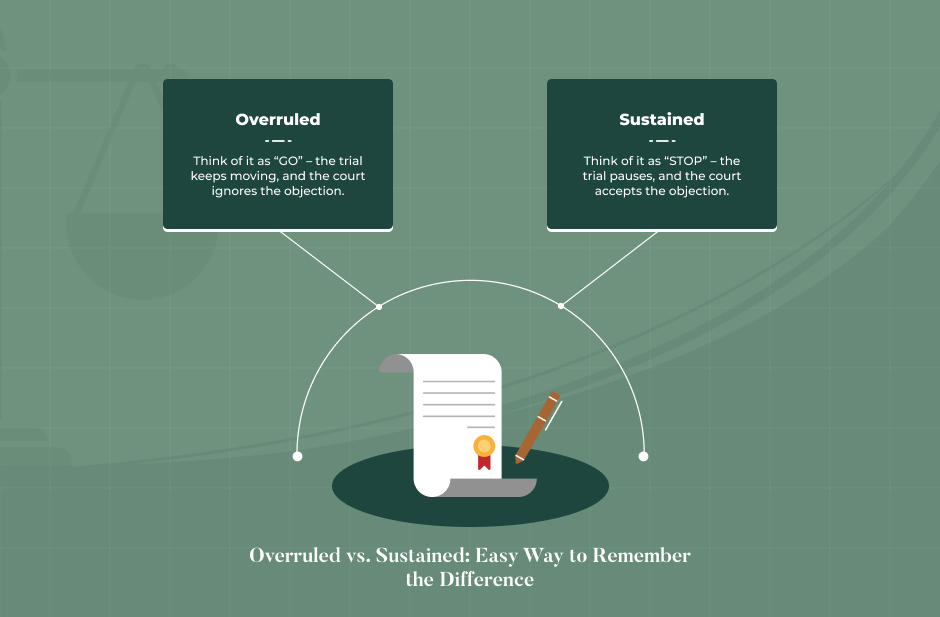
A judge makes Both overruled and sustained decisions when a lawyer objects to something during a trial.
If the judge says “Overruled,” they do not agree with the objection, and the trial continues as if the objection never happened.
If the judge says “Sustained,” they agree with the objection, and the question or evidence is not allowed.
Let me explain the differences in more detail.
1. What Happens When an Objection Is Overruled?
First, when a lawyer objects in court, they ask the judge to stop a question, statement, or evidence. If the judge says “Overruled,” they are rejecting the objection. Additionally, this means:
- The court ignored the lawyer’s objection.
- A witness must answer the question.
- The evidence or statement remains part of the trial.
For example, if a lawyer says, “Objection! That question is unfair,” but the judge replies, “Overruled,” the question stays, and the witness must answer.
2. What Happens When an Objection Is Sustained?
Secondly, if the judge says “Sustained,” they agree with the objection. Additionally, this means:
- The court accepted the lawyer’s objection.
- A witness does not have to answer the question.
- The court does not allow evidence or statements.
For example, if a lawyer asks a witness, “Did you hear what someone else said about the case?” the other lawyer might object because that is hearsay (a rule that prevents secondhand information in court). If the judge says “Sustained,” they will not allow the question, and the witness does not answer.
Overruled vs Sustained: Example of a Hypothetical Case
Meet Alex, a young detective who loves solving mysteries. One day, Alex’s bicycle goes missing. He believes his neighbor, Sam, took it. The case goes to court, where lawyers argue to find the truth.
1. A Question That Gets Overruled
Sam’s lawyer asks Alex, “Did you hear someone say that Sam took your bike?”
Alex’s lawyer quickly stands up and says, “Objection! That’s hearsay!” (This means Alex is being asked to repeat what someone else said, which is not direct evidence.)
The judge thinks for a moment and says, “Overruled.” This means the question is allowed, and Alex must answer.
2. A Question That Gets Sustained
Later, Alex’s lawyer asks a witness, “Don’t you think Sam looks like someone who would steal a bike?”
Sam’s lawyer jumps up and says, “Objection! That’s unfair and based on opinion!”
This time, the judge says, “Sustained.” This means the judge does not allow the question, and the witness does not have to answer.
3. The Final Verdict
With fair questions and proper objections, the court finally finds the real thief—a sneaky raccoon who rolled the bike away! The lawyers could use only the right evidence to solve the case thanks to legal terms like “overruled” and “sustained” when it comes to objections.
Your Legal Guide: Understanding the Differences in Courtroom Terms
If you were searching about the meaning and differences of overruled vs sustained, I hope that this article has been helpful to you. If you have any other queries related to the same, please feel free to let me know.
All you need to do is scroll down until you reach the bottom of the page. Then, leave your comments in the box below. I will be happy to help you out with the same.
Read Also:








